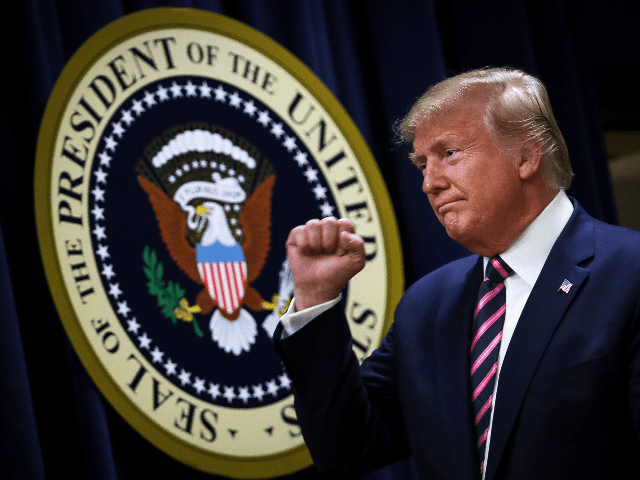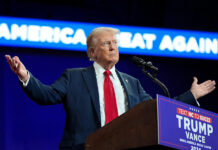Fulton County District Attorney Fani Willis indicted former President Donald Trump and 18 lawyers, aides, and supporters in Georgia late Monday night for their efforts to challenge the 2020 presidential election results.
It was the fourth indictment of Trump, after a New York indictment for allegedly falsifying business records in the Stormy Daniels affair; a federal indictment in Miami over presidential records; and a federal indictment in Washington, D.C., over January 6.
Here are 11 key takeaways.
1. The RICO statute is a tactic to secure an easy conviction of Trump, even if it is overturned. The Georgia case invokes a Racketeer Influenced and Corrupt Organizations (RICO) statute, of the kind used to prosecute mobsters for large criminal enterprises. As Harvard Law School professor Alan Dershowitz noted, RICO prosecutions often survive early procedural motions, and lead to convictions, though they are often overturned on appeal. Democrats want a conviction before Election Day.
2. The indictment was rushed, and leaked by Fulton County before the grand jury had voted. Though a “special” grand jury — with a clear anti-Trump bias — had already recommended charges against Trump, the grand jury that voted to indict him on Monday only heard testimony for one day. Hours before the grand jury voted, however, the county court posted, then deleted, a document that resembled the final indictment, which may have violated Trump’s rights and suggests a rigged process.
3. DA Fani Willis is fundraising off the prosecution and running for reelection next year. Willis was reprimanded by a judge last year for hosting a fundraiser for a Democrat who was running against one of the potential targets of her grand jury investigation. She is also running for reelection in 2024. Like Manhattan DA Alvin Bragg, who ran explicitly on a promise to find a way to prosecute Trump, Willis’s own political and fundraising interests are hard to separate from her handling of the case.
4. The indictment was announced shortly before midnight, for no apparent reason. There was no reason for Willis to rush the indictment before midnight, or to hold a late-night press conference, other than to ensure that the indictment would dominate news coverage the following day. The fact that the indictment was filed in the “dead of night” reinforced the sense that this is fundamentally a political prosecution, meant to cause maximum damage to Trump as the 2024 presidential race begins.
5. The indictment includes lawyers, aides, and even supporters. The Georgia indictment seeks to convict and imprison members of Trump’s legal team for the supposed crime of crafting a strategy for challenging the 2020 election results, including by claiming that there were voting irregularities. By that standard, almost every election lawyer in the country could be a target for prosecution — Democrats also claimed voting machine problems in 2020, for example — but only Republicans were charged.
6. Kanye West’s former publicist is included in the indictment. Trevian Kutti, who worked for “Ye” (though not at the time, apparently) is accused of pressuring an election worker, Ruby Freeman, to testify about participating in supposed ballot-counting irregularities. The indictment accuses a pastor, Stephen Lee, of asking Harrison Floyd of Blacks for Trump to convince Kutti to pressure Freeman. The indictment does not connect Lee, Floyd, or Kutti to any officials on Trump’s campaign team.
7. The indictment claims political statements are “act[s] in furtherance of the conspiracy.” The indictment cites ordinary political statements as if they were criminal acts. These include retweets urging people to contact public representatives; criticism of elected officials; claims that the Constitution allows the vice president to reject Electoral College votes; and tweets by Trump urging people to watch TV. Aides are also accused of crimes because they reserved rooms or asked for phone numbers.
8. The indictment covers conduct in other states, not just in Georgia. While the indictment focuses on Georgia, it includes conduct in other states, such as a public hearing about voting irregularities in Pennsylvania. It also attempts to implicate Trump and his campaign in violations of federal laws, suggesting that the local, county prosecutor thinks she can enforce federal law. That may be an attempt to steal the limelight from U.S. Special Counsel Jack Smith; it may also be unconstitutional.
9. Trump faces a possible 76.5 years in state prison on 13 counts, which would not be easy to pardon. That brings Trump’s total potential sentence, across all of his indictments, to 717.5 years in prison, or possibly the death penalty, which is available for one of the charges in the federal indictment over January 6. Unlike other states, Georgia does not give its governor the power to issue pardons. He could try a presidential pardon, which has never been used before to supersede a state conviction.
10. The indictment does not mention Lin Wood, a major proponent of voter fraud claims. Wood, who recently gave up his law license in Georgia, was also called to testify before the Fulton County grand jury last year. He was probably the most vociferous advocate for the idea that there had been voter fraud in Georgia, to the point of encouraging Republican voters to boycott the Senate runoff elections in the state in January 2021 in protest. Curiously, his name is absent from the indictment.
11. Neither Stacey Abrams nor Hillary Clinton have been indicted in Georgia for the same, or worse, actions. Abrams, the losing gubernatorial candidate for Democrats in 2018 and 2022, claimed that her first race had been stolen, and worked with Democrats across the country to change voting rules in advance of the 2020 election. Clinton and her acolytes promoted the “Russia collusion” hoax, conspiring with journalists and prosecutors in an attempt to overturn the 2016 election.
If successful, the Georgia indictment could effectively criminalize Republican — and only Republican — efforts to challenge election results, now and in the future. It could also have a chilling effect on free speech and assembly, through 2024 and beyond.
Joel B. Pollak is Senior Editor-at-Large at Breitbart News and the host of Breitbart News Sunday on Sirius XM Patriot on Sunday evenings from 7 p.m. to 10 p.m. ET (4 p.m. to 7 p.m. PT). He is the author of the new biography, Rhoda: ‘Comrade Kadalie, You Are Out of Order’. He is also the author of the recent e-book, Neither Free nor Fair: The 2020 U.S. Presidential Election. He is a winner of the 2018 Robert Novak Journalism Alumni Fellowship. Follow him on Twitter at @joelpollak.





Democrats are gearing up for the next election, another steal.
Republicans are being taken to court as a warning for anyone who claims the next election was corrupted.